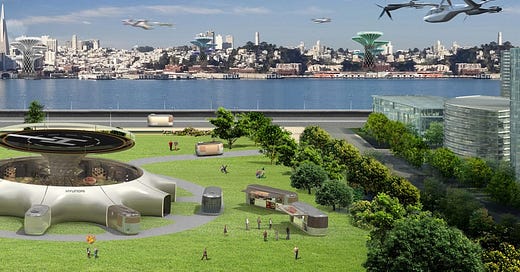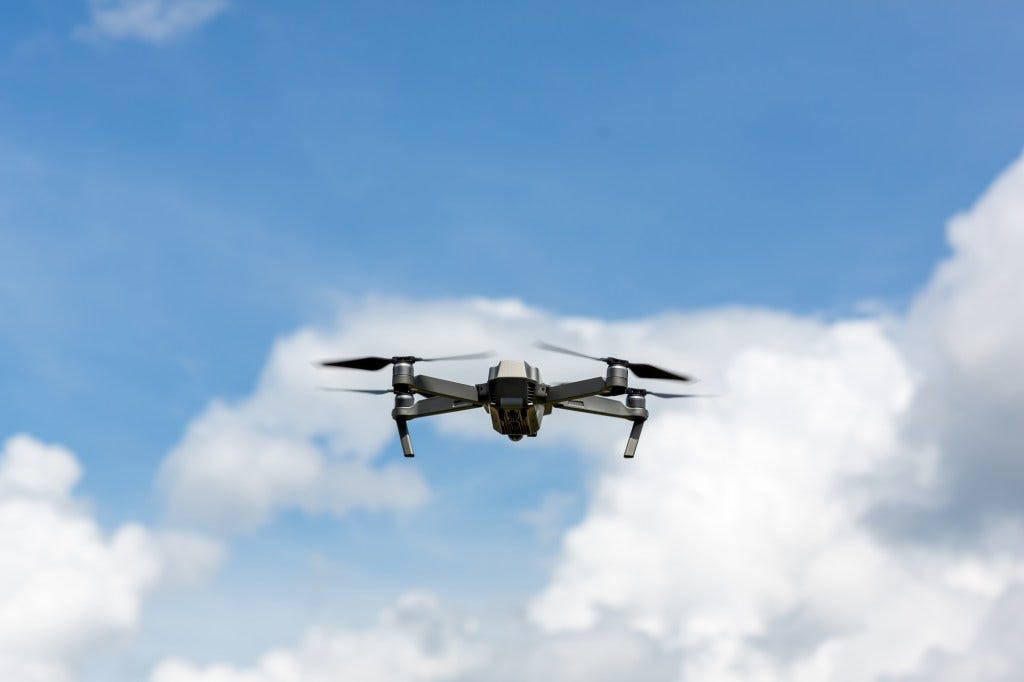Utilising Property - Air Rights For Growth
Manhattan Sold For Beads - Its Utility Turned It To Gold - Not Alchemy
Thank you to everyone for reading and for all your input this week it’s much appreciated. To contact me please email jonathan@skytrades.io
Fifteen Love
Despite the recent relaxation of drone restrictions across the five boroughs of New York City, a "zero tolerance policy" will be enforced against individuals attempting to operate drones near the US Open tennis centre. It is noted that the new requirements don’t upend years of property law but make it easier for authorities to track and monitor drones and drone operators.
NYPD Deputy Commissioner of Intelligence and Counterterrorism, Rebecca Weiner, emphasized the implementation of their counter-drone capabilities. She highlighted that while the city had recently adjusted its rules regarding drone permits, drone operations that have no permission to fly near the tournament venue would not be tolerated. The NYPD, in collaboration with law enforcement allies, maintains a firm stance against operating drones without authorisation within and around this area," Weiner informed the media.
Should anyone violate these regulations, they face potential consequences such as the confiscation of their equipment, issuance of summons, or even arrest.
Typically, authorities employ techniques like disrupting the drone's communication signals to neutralize the threat. This action can lead to the drone either crash-landing or being redirected to minimize any potential impact or risk.
The owners of the airspace are using their air rights to prevent drones they have not approved from transiting in their airspace. This is a demonstration of how strong property rights and their subset, air rights are.
It is the same situation for individual landowners’. Bringing air rights holders into the ecosystem is what will help scale drone companies’ ambitions in low-altitude airspace quicker, legally and without disruptions to their communication equipment or other issues.
Taking Your Property Rights
“An expropriation of critical… rights that is best understood as a coup from above: an overthrow of the people’s sovereignty.” - Shoshana Zuboff
Drones can transform our lives in many ways. Giving drone companies permission to transit through airspace, by using air rights helps them achieve their commercial goals, they in turn should compensate air rights holders for the use of their property.
Like Google demands payment for cloud services or Walmart wants payment for a soda, air rights holder’s permission is not a free lunch for drone companies.
Flying objects do not upend our societal contracts and laws. Drones should be a wonderful part of life, but to date, many have taken a path that has slowed them down by trying to erode private property rights rather than embracing them.
Crossing Continents
Companies on both sides of the Atlantic are trying to unleash the potential of drone delivery. What it depends on is how the people on the ground want their airspace used, as they control who is allowed in and out. The default is drones are not allowed into private airspace, the rights of every hard-working property owner should be respected. If they choose to allow a drone into their airspace that is their choice to make.
While land and air space ownership is fragmented its aggregation unleashes the drone companies’ promise without the need for them to violate individuals’ airspace, or try to bounce unsuspecting homeowners into giving up their property rights. What’s disappointing is when you look at certain drone delivery companies’ terms they expressly contract you not to violate property laws, but they then violate them.
Like an errand drone at the US Open ignorance is no defence. Drone companies who embrace individual property rights and who want to work with local communities can achieve their goals.
Irish Drone Delivery
Manna is looking to increase the amount of drone deliveries they do. They have been delivering by drone in limited ways in two small Irish towns with little or no competition. Their drone is capable of 3.5kg loads over eight kilometres according to reports. They are hoping to service another more densely populated area by flying over 130,000 Dublin residents’ homes and through the community airspace shortly.
The question has been asked how this is permitted and do the Irish Aviation Authority (IAA), the Irish equivalent of the Federal Aviation Administration (FAA) have the power to grant entry and exit into private homeowners’ airspace. It is clear from the IAA publications and communications, like the US, that the IAA regulate air safety and does not have jurisdiction over property rights.
They cannot give what they do not own, so the use of peoples’ airspace is currently without their permission.
Dronamics Soars
European company Dronamics is pushing cargo with its long-range drone, the Black Swan. The completion of its first flight in Bulgaria's Balchik airport signifies a major milestone. The 16-meter-wingspan Black Swan can carry a 350kg payload up to 2,500km, with an 80% speed boost, 50% cost reduction, and 60% fewer emissions compared to traditional modes. Collaborations with Zero Petroleum and Cranfield Aerospace Solutions highlight its commitment to environmentally-friendly propulsion.
Matternet Moves
Matternet's M2 drone, certified by the FAA, is developing healthcare logistics. It has completed over 50,000 autonomous flights in the last 5 years aiding hospital systems and partnering with UPS for prescription delivery. M2's 2kg capacity covers 20km, providing faster, more predictable, cost-effective, and environmentally friendly service.
US Private Air Rights
Regulations have slowed the Unmanned Aerial Vehicle (UAV) industry down, and getting approval to fly Beyond the Visual Line of Sight (BVLOS) has led to delays. It must be asked why drone companies are so concerned about the regulations that they have not just flown BVLOS and asked for forgiveness not permission. They are willing to trample on hard-fought and paid-for property rights so this would appear to follow the same logic.
If a drone is flown in restricted airspace the FAA may impose civil penalties of up to $32,666 per incident, they can impose criminal sanctions, which include a fine of up to $250,000 and/or a prison sentence of up to three years upon conviction. So it is important they fly in the right airspace.
“Sadly, the industry’s efforts to weaken airspace rights laws has stalled the development of private airspace sharing systems” - Troy A. Rule
Wing (Alphabet) and Walmart are using people’s private airspace, without permission or compensation, to transport their products with drones. If government wants to take your property they must fairly compensate you under Eminent Domain. Are companies that take private airspace without permission above this?
Could it be that air rights holders’ voices are not being heard amongst the choreographed din of press releases or is it something else? With the US real estate market that controls air rights reported to be worth c.$115 Trillion, it cannot be ignore for long.
The increased use of drones is to be welcomed, not only is it greener, safer and faster it also increases the valuations of people’s properties who allow them in their airspace. Using airspace without permission is not to be welcomed.
What are your rights worth, who gets to benefit from them, and would you have sold Manhattan for beads if you could see the future?
To learn more about how SkyTrades connects air rights holders with air space users contact me at jonathan@skytrades.io
I hope to see some of you at Contech Material & Superabundance 2023 this weekend.





